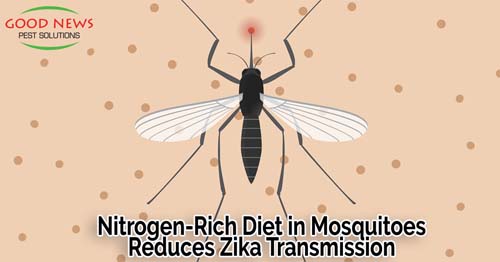
Increased Nitrogen in Mosquito's Diet Reduces Zika Transmission
It isn’t much of a surprise that researchers at one of Florida’s top universities are still working on solutions for the threat of Zika virus. Outside of Brazil and possibly Texas, Florida had one of the largest groupings of Zika virus popping up a few years back, especially once you take travel-based cases out of the mix.
We may never know what caused Zika virus to move to South America in 2015, almost 60 years after it was first discovered in the post-World War II exploration of Africa. In fact, most people have probably not thought about the virus in a while. But scientists at the University of Florida are determined to find a way to stop it in its tracks. And in the process, expand the world’s understanding of mosquitoes and the ecosystems that harbor them.
It All Starts With Diet
The results of a new mosquito diet study from UF’s Institute of Food and Agricultural Sciences and the University of Southern Mississippi were recently made public. Scientists thought that a closer look at the quality and quantity of food eaten by the Aedes aegypti might shed some light on their transmission of Zika as well as yellow fever and dengue.
Researchers started by altering the amount and type of animal and plant debris their mosquito larvae could feed on. They raised 10 distinct groups of mosquito larvae, isolating differences in the quantity of dead animal they could feed on. Then they fed the females a blood meal infected with Zika and sat back to wait.
Influencing the Carrier
One of the first things they discovered was that larvae that ate less animal matter were less likely to both become infected and transmit the often deadly disease. More study needs to be done, but they speculated that the nutrition of the food may have impacted the mosquitoes’ immune systems’ response.
Which makes you wonder if the same is true for us humans.
The other major factor they discovered, almost by accident -- a nitrogen-rich environment caused the mosquitoes to develop more rapidly and grow larger AND less likely to get infected and transmit Zika virus, regardless of their diet.
What Does It All Mean?
Like we pointed out before, the scientists at UF and USM, insist we need more study to narrow down the implications of the research. But they’re confident that further scientific investigation will lead to a better predictive model. And eventually, effective preventative measures – that work in the lab, and in the great outdoors.
Until then, the really good news is that there is a solution to biting mosquitoes in your own backyard. Our exclusive No Bite Zones Mosquito Protection Program actually rewires the biting momma mosquitoes to be vegans. And they pass this trait on to their offspring. Which means safer BBQ’s and picnics for you and your pets. Our customers from Sarasota to North Port have enjoyed mosquito-bite free summers for years now. And you can too. For more information on this or any of our organic, risk-reduced pest solutions, just give us a call!
« Back to BlogProudly Serving
Sun City Center, Ruskin, Palmetto, Parrish, Ellenton, Bradenton, Anna Maria, Holmes Beach, Bradenton Beach, Longboat Key, Lakewood Ranch, University Park, Myakka City, Sarasota, Siesta Key, Osprey, Nokomis, Casey Key, Venice, Englewood, North Port, Port Charlotte, Punta Gorda, Arcadia
Things You Can Do
Pay Your Bill Online
Leave Us a Review
Request a Free* Termite Inspection
Stop Mosquito Bites
Get Rid of Rodents
Get a Termite Damage Warranty
Get Pest Control for Your Attic
Get Pest Control for Your Business Request Prayer
Corporate Address
1080 Enterprise Court, Ste A
North Venice, FL 34275
Call Now: (941) 412-9610
Text: (941) 412-9610
Fax: (941) 412-0080
